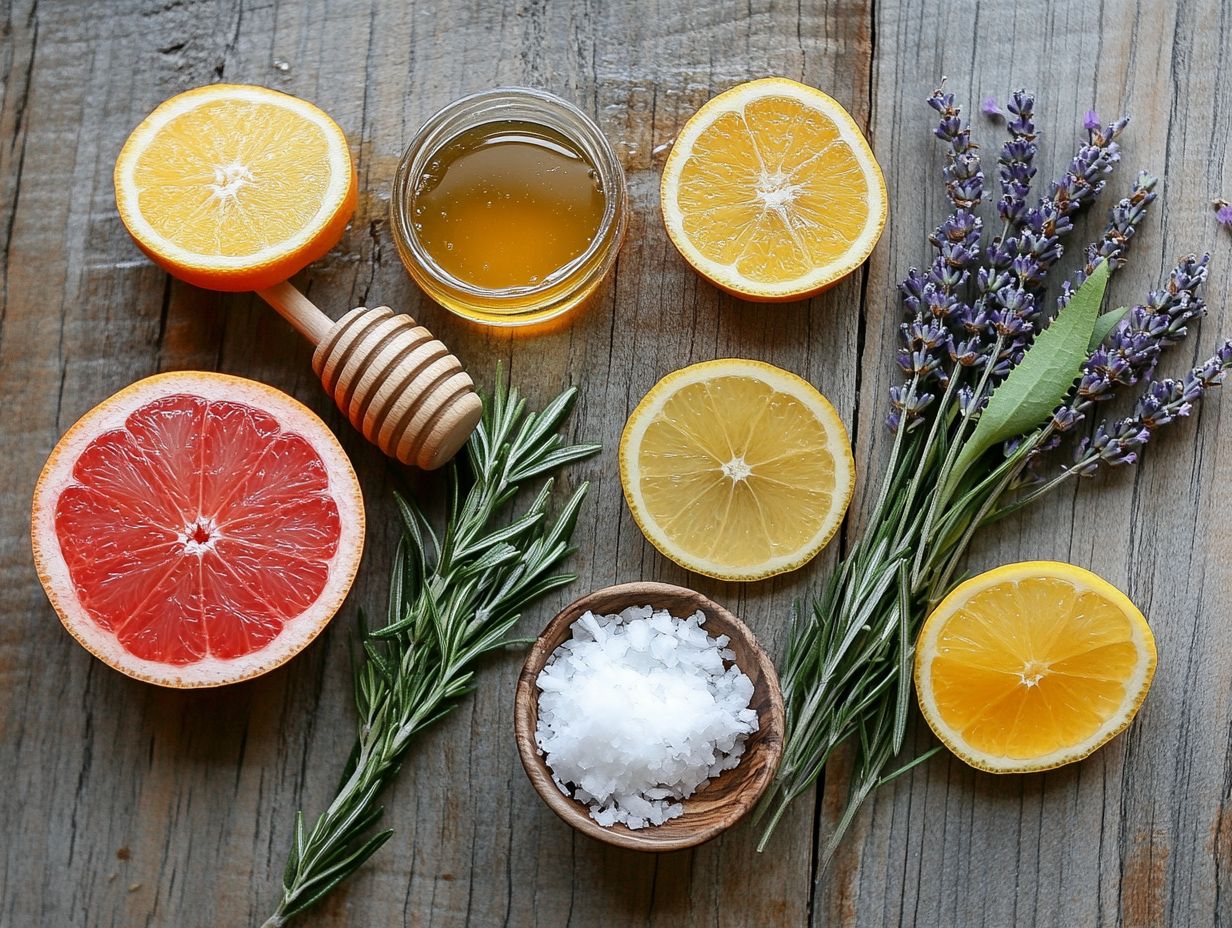In today’s world, where the skincare industry is often dominated by synthetic products, I have noticed a growing trend of individuals returning to nature for effective solutions.
Natural skincare focuses on harnessing the power of plant-based ingredients, which not only enhance beauty but also promote overall skin health.
This article will delve into the numerous benefits of using natural ingredients, while also highlighting the harmful effects of common synthetic components and suggesting effective natural alternatives.
I aim to provide insights on how to seamlessly integrate natural skincare into your routine, including easy DIY recipes for achieving glowing skin.
Key Takeaways:
What is Natural Skincare?

Natural skincare involves using beauty and skincare products that are formulated with natural ingredients instead of synthetic chemicals or harsh additives. This approach highlights the significance of clean beauty, where I select ingredients like coconut oil, green tea, and shea butter for their proven effectiveness in skincare.
Dermatologists frequently recommend natural skincare solutions due to their moisturizing and anti-inflammatory properties, which make them suitable for various skin conditions, including dry skin, eczema, and acne. I believe that these products not only enhance overall skin health but also foster a more sustainable beauty regimen.
The popularity of natural skincare has surged in recent years as I, along with many consumers, become more aware of what I apply to my skin. Unlike conventional skincare products that often contain parabens, sulfates, and synthetic fragrances, I prefer natural alternatives that prioritize ingredients sourced directly from nature.
For example, I appreciate colloidal oatmeal for its soothing properties, which effectively calms irritated skin and alleviates itching. Essential oils such as tea tree and lavender are also favorites of mine, known for their antibacterial and calming effects that further support skin wellness.
This shift toward natural products not only aligns with my desire for health-conscious choices but also reflects a growing commitment to environmental sustainability, as many brands work to reduce their ecological footprint.
Benefits of Using Natural Ingredients
I find that using natural ingredients in skincare provides numerous benefits for skin health, including enhanced moisturizing properties, anti-inflammatory effects, and a rich supply of antioxidants that promote overall skin vitality.
Ingredients such as coconut oil and shea butter are well-regarded for their exceptional moisturizing capabilities, while green tea and colloidal oatmeal offer effective remedies for skin conditions like psoriasis and eczema.
The scientifically supported advantages of these natural alternatives make them appealing choices for consumers who are looking for gentler yet effective skincare solutions.
Advantages for Skin Health

The advantages of using natural ingredients for skin health are significant, as they often possess healing properties that promote moisture retention and combat signs of aging. These benefits are largely due to their nutrient-rich profiles, which enhance skin regeneration and repair.
For instance, I find that shea butter is renowned for its deeply moisturizing qualities and contains essential fats that nourish the skin, making it exemplary for maintaining elasticity and firmness. Similarly, oatmeal is celebrated for its soothing properties, capable of calming irritated skin and aiding in wound healing. Chamomile extract also offers anti-inflammatory benefits, effectively reducing redness and swelling.
By incorporating these natural components into my skincare routine, I can achieve a more youthful appearance, support my skin’s natural defenses, and effectively deter the onset of various skin conditions.
Harmful Effects of Common Skincare Ingredients
I recognize that many common skincare ingredients can negatively impact the skin, leading to various conditions and worsening issues such as acne and blemishes.
Ingredients like parabens, sulfates, and synthetic fragrances are often examined for their potential adverse effects. Dermatologists caution that prolonged exposure to these harmful substances can compromise the skin barrier, increase sensitivity, and trigger irritation, ultimately contributing to long-term skin health concerns.
Potential Risks and Side Effects

I recognize that the potential risks and side effects associated with common skincare ingredients can vary significantly. Some substances may lead to allergic reactions or worsen existing skin conditions.
Dermatologists have observed that many beauty products containing synthetic additives can trigger inflammation or allergic responses, particularly in sensitive individuals. Understanding these risks is essential for consumers who want to choose effective skincare solutions that prioritize skin safety and health.
For example, I have noted that fragrances and preservatives like parabens are linked to increased sensitivity and contact dermatitis, especially in those predisposed to skin issues.
A study I came across indicated that patients with eczema often reported worsened symptoms after using products containing these ingredients. Additionally, certain chemical exfoliants, while beneficial for acne-prone skin, can cause over-exfoliation if used excessively, leading to redness and peeling.
Experts consistently highlight the importance of patch testing and carefully reading labels to avoid potentially harmful reactions. This approach helps ensure a more informed and cautious way to navigate skincare choices.
Natural Alternatives to Chemical Ingredients
I recognize that natural alternatives to chemical ingredients are becoming increasingly popular in the beauty industry, as consumers actively seek products that align with their health and environmental values.
Drawing on insights from beauty science, many dermatologists I consult recommend natural ingredients such as jojoba oil, squalane, and tea tree oil as effective substitutes for the harsh chemicals often found in conventional beauty products.
These natural alternatives not only promote skin health but also support sustainable beauty practices, making them an essential consideration in today’s market.
Substitutes for Common Ingredients

Substitutes for common chemical ingredients are crucial for anyone looking to establish a skincare routine centered on natural cosmetics and effective care. For example, I find that using shea butter as a moisturizing agent is a great replacement for synthetic moisturizers, and colloidal oatmeal works exceptionally well as an alternative to harsh exfoliants.
By incorporating these natural products, I can enhance my daily skincare routine without the worry of irritation or adverse effects often associated with chemical ingredients.
For optimal results, I prefer integrating avocado oil or jojoba oil in place of traditional serums, as they provide nourishment without clogging pores, leaving my skin feeling radiant and healthy. Additionally, considering honey for its antibacterial properties as a natural cleanser can significantly improve skin clarity and texture.
I believe that gradually introducing these alternatives allows me to monitor my skin’s reactions, ensuring a smooth transition to a more wholesome regimen that aligns with my beauty goals while promoting overall skin wellness.
How to Incorporate Natural Skincare into Your Routine
Incorporating natural skincare into my routine requires a careful and intentional approach to selecting products that meet my skin’s needs and align with my personal beauty philosophy.
I begin by evaluating my current skincare regimen to identify areas where I can replace synthetic products with natural alternatives, such as those containing coconut oil, aloe vera, or green tea.
By embracing gentle skincare and prioritizing effective solutions, I enhance my beauty therapy while promoting optimal skin health.
Tips for Using Natural Products
When utilizing natural skincare products, I prioritize following key tips to ensure maximum effectiveness and compatibility with my skin.
I start by patch-testing new products to identify any potential reactions and gradually introduce them into my routine to avoid overwhelming my skin.
I focus on products with reputable formulations that feature natural ingredients, such as shea butter and antioxidants, to enhance my moisturizing efforts and support overall skin health.
I regularly review the ingredient lists to ensure they align with my skin type and specific concerns, paying close attention to any potential allergens.
Consistency in application is essential; I find that daily use of natural products leads to gradual and noticeable improvements.
To keep track of my skin’s responses and the effectiveness of the products over time, I maintain a skincare journal.
Whenever I have uncertainties about a particular product, I consult with dermatologists or skincare experts to navigate the myriad of options available and make informed decisions that cater to my individual skin needs.
DIY Natural Skincare Recipes
I find that DIY natural skincare recipes give the power to me to create effective homemade options that cater to my skin’s unique needs, blending creativity with self-care.
By using ingredients like coconut oil, green tea, and essential oils, I can address various skin conditions while promoting overall skin health.
Embracing organic products allows me to ensure that my skincare routine aligns with clean beauty principles.
Easy and Effective Homemade Skincare Options
Creating easy and effective homemade skincare options allows me to harness the power of natural ingredients while ensuring that my beauty therapy is customized and safe for my skin health. Simple recipes featuring aloe vera, jojoba oil, and shea butter provide hydration, nourishment, and anti-inflammatory benefits, making them suitable for various skin types.
These ingredients not only promote a radiant complexion but also align with the principles of clean beauty by avoiding harsh chemicals and synthetic additives.
For instance, I find that a soothing aloe vera gel can effectively calm irritated skin, while jojoba oil mimics my skin’s natural sebum, making it ideal for balancing oiliness without clogging pores. Shea butter’s rich fatty acids offer intense moisture, particularly for dry or sensitive areas.
By exploring such DIY recipes, I can develop a skincare routine that caters to my unique needs and supports overall skin vitality.


